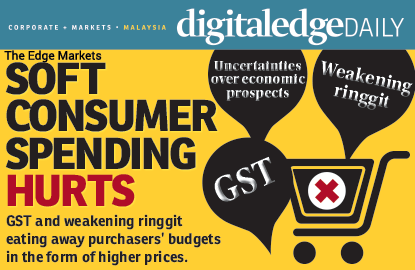
KUALA LUMPUR: Malaysian consumers are tightening their belts. This is hurting companies’ earnings. It also raises concerns whether one of the economic growth engines — consumer spending — is sputtering out soon.
The goods and services tax (GST) and the weakening ringgit are eating away consumers’ budgets in the form of higher prices. The slew of news on job retrenchments and companies shutting down production plants is making consumers even more prudent on spending.
The Malaysian Consumer Sentiments Index has been on the decline since 2009. The index has touched a six-year low of 71.7 points in the second quarter (2Q15). In 1Q15, the index stood at 72.6 points.
For 2Q15, being the maiden quarter of the implementation of the GST, companies across various sectors have posted dismal earnings.
Jewellers, such as Tomei Consolidated Bhd, Degem Bhd and Bonia Bhd, saw their earnings down sharply in 2Q15. Consumer goods companies, like Nestle Malaysia Bhd and Dutch Lady Milk Bhd, managed to achieve growth as they were blessed by low commodity prices that helped reduce their input costs, hence mitigated the impact of weak consumer spending.
Retail Group Malaysia’s (RGM) latest retail sales data showed that the dent caused by the imposition of the GST in consumer sentiment is far worse than expected.
The country’s retail sales recorded the biggest quarterly fall since 1998, declining as much as 11.9% in 2Q15 year-on-year due to the combined impact of the GST and the weaker ringgit.
In view of the continued softening spending, RGM has revised downwards its annual growth forecast for the fourth time to 3.1% from 4% previously.
However, some investment analysts are hopeful that consumer sentiment would improve in the second half of the year, particularly during the year-end festive season when shoppers tend to loosen their purse string.
Kenanga Investment Bank Research said in a report last Wednesday that it expects retail sales to recover from the low base in 2Q15 when consumers have adapted to the new costing environment.
The research outfit reckoned that the pace of recovery in the retail space might be slower due to the non-discretionary nature. “Further marketing activities such as giving discounts and sale promotions are expected in order to lift the sentiment,” it added.
Meanwhile, UOB Kay Hian Research said in a note to clients last Friday that sales will still be soft in 3Q15, a strong recovery could only be seen in 4Q15 on the back of the normalisation of spending.
It said food and bevarage (F&B) companies, for example Nestle, will be resilient amid the softening consumer spending; while non-F&B retailers will need to brace themselves for a weak 3Q15.
Non-F&B companies, according to UOB Kay Hian, will suffer a more significant impact as consumers are likely to cut spending on discretionary items.
The stockbroking firm expects retailers will continue to suffer from margin squeeze as a result of offering higher discounts to drive sales, as well as absorption of any increase in costs from a potential hike in operating costs, particularly rental and personnel.
Some analysts see the silver lining to the dark cloud. But others may dispute that consumer spending is usually higher in the second half of the year; hence, the question is whether Malaysians are spending the same amount as they did before, if not more, during the coming year-end festive season.
It may be worth noting that Malaysia’s Purchasing Managers’ Index in August dropped to a 34-month low of 47.2 from 47.7 in July. Slowdown in manufacturing activities does not augur well for the economy and employment.
A survey conducted by the Malaysian Institute of Economic Research earlier also revealed more Malaysians experience financial deterioration and consumer spending is expected to be less robust going forward.
A saving grace is probably the low petrol pump price thanks to the meltdown in international crude oil prices.
Consumer spending and private investment have been the key economic growth drivers of the domestic economy in the past three years at least, as the country’s exports have not been strong. Also, the public expenditure is limited given that the federal government needs to be prudent on its spending as well, in order to narrow the yawning budget deficit.
The recent wave of uncertainties over the global and domestic economic fronts has also prompted some to wonder whether consumers are now in a vicious circle.
As the economic outlook gets gloomy, this will discourage consumers from spending; consequently the economic growth will lose steam. This would cause a chain effect on companies’ profits, employees’ salary and even job security. As a result, consumers would shop even less.
This article first appeared in digitaledge Daily, on September 7, 2015.